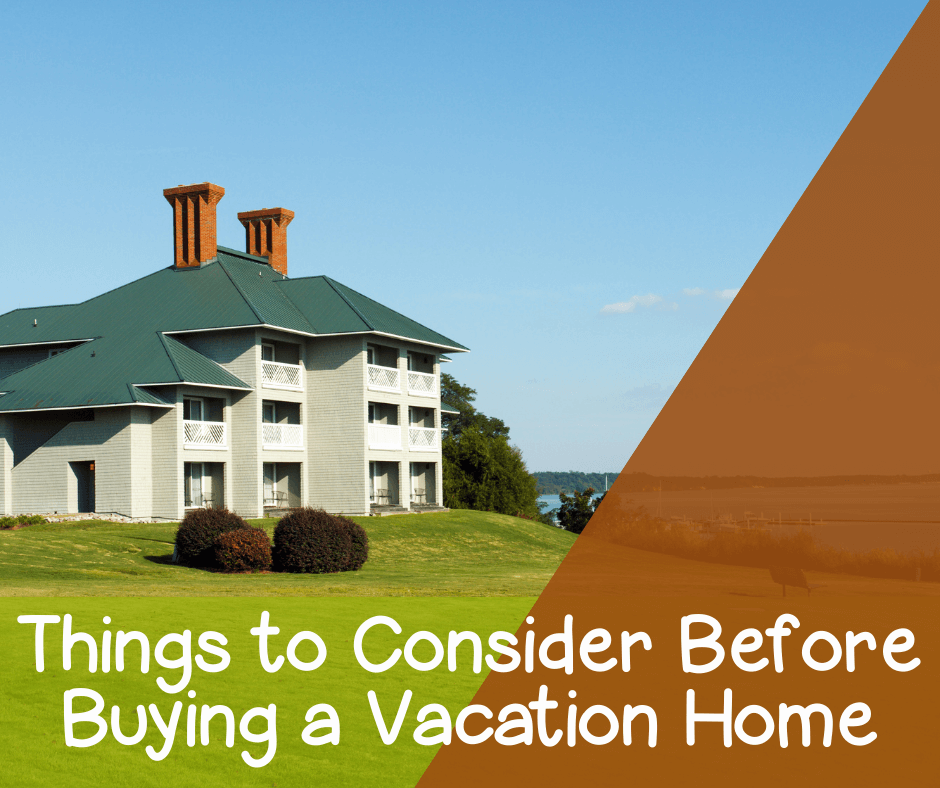Have you ever thought about the things to consider before buying a vacation home? Over the past year, low mortgage rates combined with the trend of working from home permanently and the desire for more space have caused the vacation home market to boom. Vacation home sales exceeded both existing-home sales and first-time buyer sales in 2020 by 16.3%.

Vacation homes can serve as a family getaway, a means of building equity, or even a retirement home in the future. No matter what your motivation, it’s important to understand a few things before you sign.
What Makes Them Hot
Flexibility
Are you interested in being able to work wherever you want? Remote working has become more common, so taking a vacation does not require you to miss work. Now seems like a good time to buy a vacation getaway if you’ve been considering it for a while.
81% of vacation destinations experienced an increase in home sales year-over-year from July to September 2020.
Benefits related to mental health
We can all benefit from a change of scenery nowadays. A change of scenery, whether it’s the beach, woods, or mountains, can revitalize you. Spending time in nature can ease depression and stress symptoms, especially if you’re moving from a city to a suburban or rural area. Harvard Health explains the benefits of spending time in nature.
Advantages in financial terms
Buying a vacation home could be more cost-effective than renting a place to stay when you regularly go on vacation for a month or two. If you aren’t there, you could rent it out. Over time, a vacation home in a desirable area can be worth a lot more, building up equity and creating wealth.
The Difference between Vacation Home and Investment Property:
Vacation Home
There are rules governing the classification of a vacation home, also known as a second home. It’s important to understand what qualifies as a vacation home since it can impact your mortgage terms and tax obligations. Vacation homes are residences where you plan to spend at least a part of the year. More specifically:
- It is required that you occupy the dwelling for 14 days or more every year, or 10% of your total rental period. You can also consider it an investment property if you occupy it less frequently.
- The distance from your primary residence must be “reasonable”, usually between 50 and 100 miles.
Fun fact
In general, 62% of people want their vacations to be within driving distance of home.
In addition to the number of nights you stay at your home, its classification affects how much you can deduct on your taxes, which mortgage program and rate you qualify for, and how much of a down payment you require. The loan process for a vacation home is much easier than for an investment property. While buying a second home you will need:
- Reserve two months’ worth of mortgage payments for each house
- At least a 10% down payment
- 640 or higher credit score
- A DTI ratio of 45% or less
Generally, you can deduct your mortgage interest and property taxes on your vacation home, just as you can with your primary residence. You are not required to report the rental income of a home you rent for less than 15 days per year. Nonetheless, you cannot deduct the costs of maintaining the property in the same way that you can with a rental.
Investment Property
A rental property, on the other hand, is a property you intend to rent out to generate income. It is an investment property if the owner occupies the home for fewer than 14 days or less than 10% of the time, he rents it. It can be tough to qualify for a mortgage for investment properties because lenders view them as more likely to default.
- Cash reserves of 3 to 6 months are needed
- For a multifamily building, a down payment of at least 25% may be required
- Generally, rates of interest are higher than in vacation homes
- A credit score of 640 or more
- Qualifies for tax breaks that relate to maintenance of the property
- Rental income can be used to demonstrate mortgage eligibility
When you purchase a vacation home, you will be expected to make two mortgage payments, two tax payments, two insurance payments, two utility payments, and possibly a property manager as well. The price of vacation homes may seem high, but if they are within your budget, they can be a great deal! If you are wanting more information, contact Louisiana Landsource at 601-996-5160 today!
